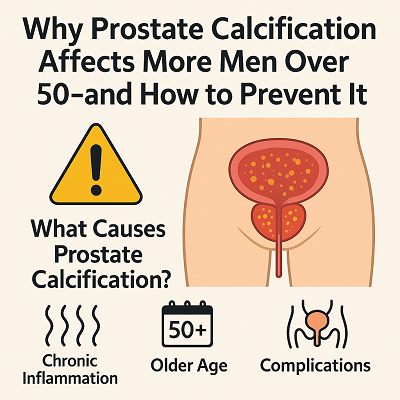Why Prostate Calcification Affects More Men Over 50—and How to Prevent It
Prostate calcification is a common but often overlooked issue in men, especially those over 50. It refers to the buildup of calcium deposits in the prostate and is usually discovered incidentally during medical imaging. Although it may not initially cause symptoms, it can signal underlying inflammation or lead to complications if left untreated.

What Causes Prostate Calcification?
Prostatic calcification is typically formed as a result of chronic inflammatory infections and is prone to recurrent prostatic inflammatory infections. The prostatic fluid secreted by the prostate is a component of semen and directly affects fertility. It is usually accompanied by pain in the lower abdomen, perineum, hips, and other areas. If not treated promptly, it can lead to various complications, such as seminal vesiculitis, epididymitis, orchitis, erectile dysfunction, premature ejaculation, male infertility, and others.
Prostatic calcification predominantly occurs in individuals aged 50-65 years. Men in this age group often face higher stress levels and hormonal fluctuations, which can affect urinary function and increase the risk of prostate problems. This leads to "spasms" in the bladder neck and prostatic urethra, while the external sphincter remains relaxed. The maximum resting urethral closure pressure increases, and the urinary flow rate decreases, resulting in urine reflux. The urate components in urine readily form the nidus for calcification, and chemically-induced prostatitis caused by urine reflux further facilitates calcification formation.
If prostate calcification causes difficulty in urination, prompt medical attention is required. Calcifications may develop into stones, triggering various symptoms. Some patients experience persistent symptoms that cannot be alleviated.
For men who experience chronic inflammation or recurring symptoms, herbal formulas like the Diuretic and Anti-inflammatory Pill, rooted in Traditional Chinese Medicine, may provide a gentler long-term solution to promote prostate health and reduce calcification risks.
Typical Symptoms of Prostatic Calcification
Prostatic calcification does not present obvious specific symptoms. Symptoms only appear when it is accompanied by diseases such as prostatitis or seminal vesiculitis. The following are several typical symptoms that occur when complications arise:
- Frequent urination: Mainly refers to an increased number of urinations within a given time period. Normally, adults urinate 4–6 times during the day and 0–2 times at night. Patients may experience daytime urination frequency exceeding >10 times.
- Urinary urgency: Refers to the patient's immediate and uncontrollable need to urinate upon feeling the urge.
- Dysuria: Refers to pain or a burning sensation in the suprapubic region, perineum, or urethra during urination.
6 Habits That Help Prevent Prostate Calcification
1. Dietary Adjustment
Eat more nuts and reduce the intake of spicy, irritating, barbecued, fried, and similar types of food. Increase consumption of fruits and vegetables to ensure a nutritious diet and develop good lifestyle habits to enhance disease resistance.
2. Drink More Water
Drinking more water is also a method to prevent prostatic calcification. In daily life, it is important to drink water regularly, rather than only when feeling thirsty. When a person feels thirsty, the body is already severely dehydrated, and replenishing fluids at this point is somewhat too late. Drinking more water leads to increased urination, which reduces the likelihood of urinary tract infections, thereby helping prevent prostatic calcification. Therefore, it is essential to ensure adequate water intake and frequent urination to maintain smooth bowel and urinary movements.
3. Work-Rest Balance
Maintain a proper balance between work and rest, avoiding excessive fatigue. Overexertion can compromise the body's immune function, and when immunity is lowered, the body becomes more susceptible to pathogen invasion. Men are then prone to developing andrological diseases like prostatitis, which may subsequently induce prostatic calcification. Additionally, ensure regular sleep schedules at night and maintain consistent daily routines to alleviate mental stress.
4. Avoid Prolonged Sitting
To prevent prostatic calcification, one must avoid prolonged sitting as it impairs local blood circulation, leading to stagnation of prostatic fluid. Extended sitting is a significant contributing factor to prostatic calcification in men. If such habits exist, they should be corrected promptly.
5. Engage in Regular Physical Exercise
For men to maintain prostate health and prevent calcification, keeping the body in a youthful state is essential, and exercise serves as the optimal method to sustain this condition. Engage in appropriate physical activities, particularly exercises that strengthen pelvic muscles. Regular aerobic exercises such as running, swimming, or square dancing can effectively enhance immunity and resistance.
6. Practice Moderate Sexual Activity
Strive to regulate the frequency of sexual activity and avoid excessive indulgence. Too much sexual activity can keep the prostate in a constantly congested state, making it more vulnerable to inflammation and calcification. Middle-aged and elderly men, in particular, should exercise restraint in sexual activity, prioritizing physical health above all.
If you suffer from prostatic calcification and its accompanying symptoms, you should seek medical attention promptly and receive professional treatment under the guidance of a doctor. But before that, maintaining the aforementioned good living habits and taking preventive measures in advance is also a crucial step!



